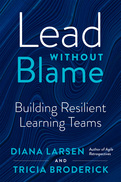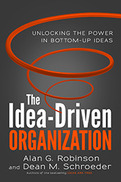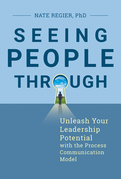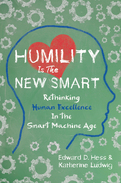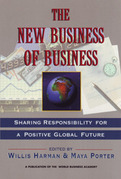2022
Workplace finger-pointing stifles creativity, reduces productivity, and limits psychological safety. Although no one sets out to be judgmental, learning new habits is hard. Two experienced leadership and agilists coaches share a road-tested leadership model that continuously embraces humility and failure as part of the growth process to deliver results.
By facilitating blame-free retrospective meetings, leaders chart a productive path forward. They amplify three essential motivators of purpose, autonomy, and co-intelligence within their team. Layered on with four resilience factors: inclusive collaboration, transparent power dynamics, collaborative learning, and embracing conflict. After applying these strategies, learning leaders will help their teams and themselves become more resilient and better equipped to handle any unexpected and challenging tasks that comes their way.
With 30% new material, including how to apply humble inquiry while working remotely, this updated edition is the definitive book on bringing humility back into your life.The global bestseller with over 300,000 copies sold returns in its 3rd edition to continue teaching people how to effectively ask and obtain accurate answers to questions across all mediums.
With 30% new material, including how to apply humble inquiry while working remotely, this updated edition is the definitive book on bringing humility back into your life.
In an increasingly divisive era where communication is often dominated by assertiveness and directive leadership, this bestselling guide offers a refreshing and essential perspective on the power of asking instead of telling. This updated 3rd edition offers practical advice for how to build relationships based on curiosity and foster collaboration and trust between team members.
Lessons in this book will help you:
•Build healthy relationships with people from different occupational, professional, and national cultures
•Create psychologically safe work climates that allow people to feel safe to share what they know
•Foster teamwork and bust hyper-competitiveness through open communication, trust, and coordination
In this new edition, updates have been made to 30% of the book that delves into the fresh challenges inherent in today's workplace, including new stories and case examples as well as an entire additional chapter with a focus on humble inquiry in the context of remote and hybrid work.
In this follow-up to their bestseller Ideas Are Free, Alan G. Robinson and Dean M. Schroeder show how to align every part of an organization around generating and implementing employee ideas and offer dozens of examples of what a tremendous competitive advantage this can offer. Their advice will enable leaders to build organizations capable of implementing 20, 50, or even 100 ideas per employee per year.
Citing organizations from around the world, they explain what's needed to put together a management team that can lead the type of organization that embraces grassroots ideas and describe the strategies, policies, and practices that enable them. They detail exactly how high-performing idea processes work and how to design one for your organization.
There's constant pressure today to do more with less. But cutting wages and benefits and pushing people to work harder with fewer resources can go only so far. Ironically, the best solution resides with the very people who have been bearing the brunt of these measures. With Robinson and Schroeder's advice, you can unleash a constant stream of great ideas that will strengthen every facet of your organization.
NASA, Pixar Animation Studios, and BMW all use the Process Communication Model as a way of training leaders to connect effortlessly with anyone. This book simplifies the complex model to make it easy for anyone to use.
Today, more than ever, leaders need a new style of leadership. They are realizing that true transformation happens through meaningful relationships, and discovering that the key to sustainable connections that create possibility and potential is through communication.
In Seeing People Through, we take a deep dive into The Process Communication Model (PCM), a behavioral communication model that teaches people how to assess, connect, motivate, and resolve conflict by understanding the personality types that make up a person's whole self, which is the key to leveraging personality diversity.
PCM is more than a lens for understanding how people see things differently; it's a deep journey into self-awareness and self-transformation. In this book, new emerging leaders, senior leaders, and seasoned consultants alike will develop a fresh and relevant framework on leadership that is consistent with emerging trends, and they will learn how individual and collective concerns can be reconciled in leadership.
NASA, Pixar Animation Studios, and BMW are just some of the companies who have all used PCM as a way to build better relationships through authenticity, trust, agility, and positive influence-and now you can, too!
Smart machines are replacing more and more jobs. Edward Hess and Katherine Ludwig show how to develop abilities that machines don't have so we can thrive in this Smart Machine Age. Underlying them all is a sense of personal humility: honestly recognizing our limitations and working to mitigate them.
In nearly every industry, smart machines are replacing human labor. It's not just factory jobs-automated technologies are handling people's investments, diagnosing illnesses, and analyzing written documents. If we humans are going to endure, Edward Hess and Katherine Ludwig say we're going to need a dose of humility.
We need to be humble enough to let go of the idea that smart means knowing the most, using that information quickest, and making the fewest mistakes. Smart machines will always be better than we are at those things. Instead, we need to cultivate important abilities that smart machines don't have (yet): thinking critically, creatively, and innovatively and building close relationships with others so we can collaborate effectively. Hess and Ludwig call this being NewSmart.
To develop these abilities, we need to practice four specific behaviors: keeping our egos out of our way, managing our thoughts and emotions to curb any biases or defensiveness, listening to others with an open mind, and connecting with others socially and emotionally. What all these behaviors have in common is, again, humility-avoiding self-centeredness so we can learn from and work with other humans. Hess and Ludwig offer a guide to developing these NewSmart abilities and to creating organizations where these qualities are encouraged and rewarded.
- Brings together a stellar group of today's most creative thinkers in the area of business and global change, including Harlan Cleveland, Joel Kurtzman, Riane Eisler, Patricia McLagan, David Korten, Peter Russell, Hazel Henderson, and many more
- Encourages broad dialogue on the important socio-economic, ecological, and moral questions facing business today
- Examines the responsibility and opportunities of businesses and business people to make significant contributions to the future of humanity
"The business of business is business!"
For many years, this credo, articulated by General Motors President Alfred T. Sloan, Jr., in 1923, has justified virtually every decision made in the business world. Especially in the United States, there was little doubt that the function of the private sector was to provide for the needs of society and to generate wealth. Other matters would be dealt with by public-sector bodies and agencies. To be sure, corporations were called upon to assume a reasonable degree of social responsibility, and the work environment was to be less regimented than in the past, and more encouraging of self-actualization. But both of these were subject to, and to an extent justified by, improvement in the financial bottom line.
But as the world rushes toward the end of the millennium, many people see increasing signs that some sort of fundamental change is taking place. Some trends are clearly with us and generally assumed to be positive-globalization of the economy, continued economic growth, spreading democratization, accelerating technological advance, burgeoning global communication. Other trends are less positive and are, so far, unyielding to remedial efforts-increasing inequality, progressive destruction of the natural environment, increasing concentration of power and wealth, rising unemployment and underemployment together with "jobless growth." Meanwhile, there is spreading talk of a "new paradigm" in the business world, and behind that of emergence of a new worldview. This new world view mandates that we transcend the traditional view of the role of business.
Since 1992, the World Business Academy has published an impressive number of articles aimed at exploring aspects of this emerging "new paradigm" in its quarterly journal Perspectives on Business and Global Change. This edited volume collects twenty-one of these essays from some of today's finest thinkers in the area of business and global change, and stimulates dialogue and debate on the future of business. Their contributions address a broad range of difficult issues-from corporate accountability and money's demise to the spiritual poverty of business-and pose such challenging questions as: What is sustainable change? Is progress possible? What is wise leadership?
Business people in decision-making positions who can influence the way their companies affect the world-executives, managers, financial officers, investors, consultants, business professors, and government policy makers-will want to reflect on these cutting edge essays. Far-reaching in scope, these insightful contributions from important thinkers will appeal to all those who seek a broader understanding of current global socio-economic trends.
- Brings together a stellar group of today's most creative thinkers in the area of business and global change, including Harlan Cleveland, Joel Kurtzman, Riane Eisler, Patricia McLagan, David Korten, Peter Russell, Hazel Henderson, and many more
- Encourages broad dialogue on the important socio-economic, ecological, and moral questions facing business today
- Examines the responsibility and opportunities of businesses and business people to make significant contributions to the future of humanity


